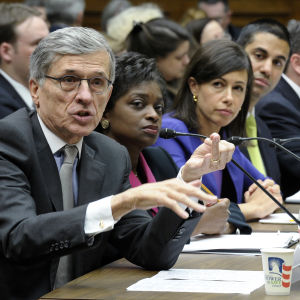Divisive rules to open up the cable set-top box market and establish price caps for high-capacity business internet service won’t come up for a vote at the Federal Communications Commission until a Republican succeeds Democratic Chairman Tom Wheeler next year.
The announcement came after the FCC’s November open meeting, when commissioners were scheduled to vote on the price caps for high-capacity internet service to mobile carrier cell towers, ATMs, small businesses and public services like schools and libraries that major internet providers largely opposed. That was until congressional Republicans called on Wheeler this week to halt advancing any “controversial” proposals until the transition between the Obama-Trump administrations is complete.
Reforming the business data services (BDS) market is the second of two high-profile agenda items Wheeler has been forced to retreat from at the tail end of his tenure. The chairman dropped what would have been landmark rules to compel pay-TV providers to offer their content on free apps instead of requiring subscribers to rent set-top boxes monthly just before its September open meeting.
“I hope that this doesn’t mean that these issues won’t be quickly addressed after the transfer of leadership of this agency,” Wheeler said, adding any repeal of net neutrality or internet provider privacy rules that will go down as his crowning achievements “would be a real mistake.”
The chairman said the items will remain on circulation, a designation that allows him to pass them via votes outside an open meeting, but that’s unlikely to happen.
Though lawmakers pressed the chairman to halt Thursday’s BDS vote, it was one of his two fellow Democrats — Commissioner Jessica Rosenworcel — that refused to give Wheeler the set-top box vote he needed to overcome opposition from the FCC’s two Republicans. Rosenworcel said she didn’t think the agency had the authority to establish a body to review licensing agreements between pay-TV providers and the third-party device manufacturers they would have to offer their apps on.
Rosenworcel is currently waiting on Congress to approve her re-nomination to the FCC, without which she’ll have to step down at the end of the year. Republicans eager to get a commitment from Chairman Tom Wheeler to step down when President Obama leaves office in January have held up a floor vote on Rosenworcel’s second term.
While Wheeler previously promised the Senate committee charged with overseeing the FCC a smooth transition, he declined again Thursday to give a definitive departure date.
“I serve at the pleasure of the president,” he said. “I am committed to a smooth transition. I have not decided on a departure date, but I will keep you posted.”
Though Wheeler will have to step down as chairman, his term as a commissioner at the agency doesn’t end until November 2018, meaning he could replace Rosenworcel if she isn’t re-nominated (though he’s repeatedly gone to bat for her re-nomination while testifying before the committee).
Congressional Democrats upset over the stalled items took out their frustration on Rosenworcel this week, with Democrat Sens. Ed Markey of Massachusetts and Ron Wyden of Oregon placing their own holds on Rosenworcel, who they blamed for stalling the set-top box vote and another item dropped from Thursday’s agenda to use more Universal Service dollars to expand rural mobile broadband networks as part of the FCC’s Mobility Fund.
A spokesman for Markey’s office told Multichannel News the senator “wants a commissioner who is unequivocally committed to pro-consumer and pro-competition policies. Recent actions from Commissioner Rosenworcel on the proposed set-top box rule and other items have called that commitment into question.”
Wyden’s hold appears to have stemmed from the stalled Mobility Fund vote, which he said in statement reported by Morning Consult was “due to the inaction of one acting commissioner.”
“I regularly hear from Oregonians in rural counties that it is clear high costs are preventing private sector broadband investment in parts of rural Oregon,” the senator said in a separate statement Thursday. “The FCC must fulfill its responsibility to provide a lifeline to rural communities and a connection to the global economy. Wireless cell service and broadband internet spur economic opportunity, improve public safety and increase educational outcomes for rural Americans. Any delay causes these rural communities to wait even longer for help.”

